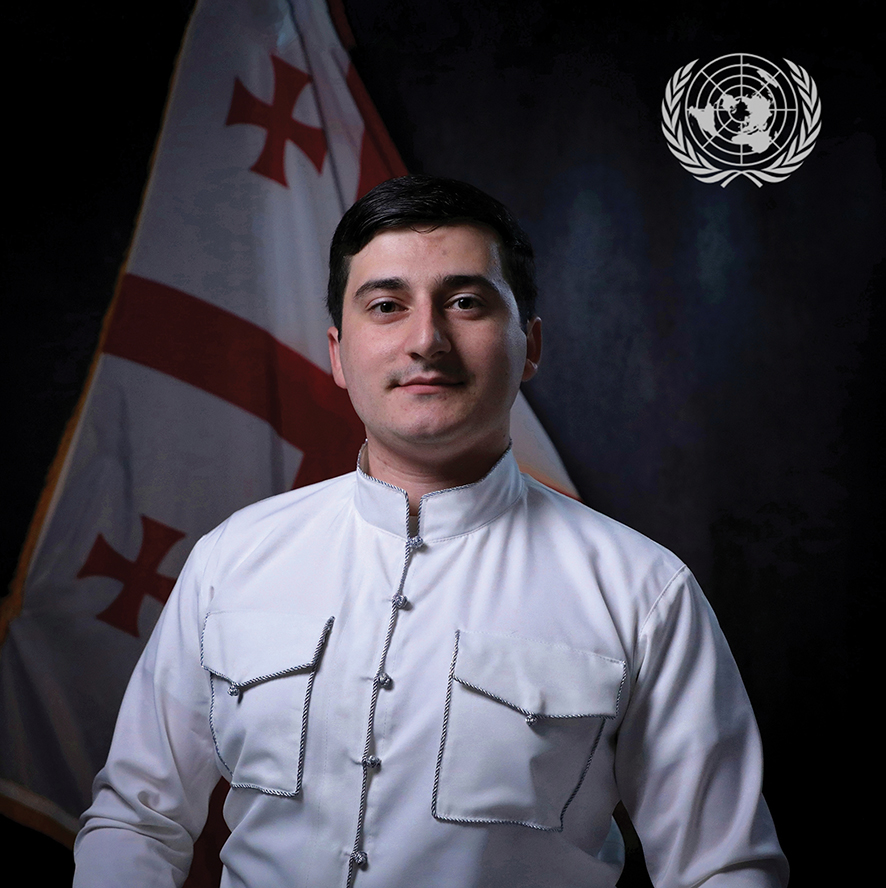The United Nations recognizes that young people around the world are key agents for social change, economic development and technological innovation. It has further recognized that youth should participate in decision-making processes, since their outcomes affect both their lives and their futures. In addition to being able to mobilize support, the contributions and unique perspectives of young people need to be factored in when shaping the future (World Program of Action for Youth, A/RES/50/81, Paragraph 104; United Nations Conference on Environment and Development, Agenda 21, paragraph 25.2).
What is a United Nations Youth Delegate?
The United Nations General Assembly has recommended that Member States include a youth representative in their delegations, starting in 1981 with Resolution RES/36/17.
In particular, the World Program of Action for Youth to the Year 2000 and Beyond, which was adopted by the 50th plenary session of the General Assembly, repeated this in calling upon Member States to:
“…Include Youth Representatives in their national delegations to the General Assembly and other relevant United Nations meetings, thus enhancing and strengthening the channels of communication through the discussion of youth-related issues, with a view to finding solutions to the problems confronting youth in the contemporary world.”
In 1995, the United Nations formally strengthened its commitment to young people by adopting the World Program of Action for Youth (WPAY). It provides a policy framework and practical guidelines for national action and international support to improve the situation of young people, and was expanded in 2007 to cover additional action areas relevant to youth. The framework’s priority action area on the full and effective participation of youth in the life of society and in decision-making invites “governments to strengthen the involvement of young people in international forums, inter alia, by considering the inclusion of youth representatives in their national delegations to the General Assembly.” (A/RES/62/126)
Another resolution in 2004 reiterated this recommendation, but acceptance and implementation of these recommendations by Member States has been slow. In 2003, only five countries – Australia, Denmark, the Netherlands, Norway and Sweden – sent a youth representative as part of their delegation. Georgia joined the initiative only in 2012, when the first Representative of the Youth to the UN was chosen.
What does a Youth Delegate do?
As the Representative of Youth, the delegate makes statements at UN HQ during official summits, forums and conferences. In Georgia, this also includes regional visits to facilitate communication with municipality youth centers.
Roles and mandates are generally determined by the authority responsible for youth development in a country (in cooperation with the Ministry of Foreign Affairs (or its equivalent) and the permanent mission to the United Nations), and are usually decided in consultation with the national youth structure (i.e. National Youth Council). In Georgia, the Youth Representative to the UN is elected by a special commission with members from the UN Resident Coordinator in Georgia, the Ministry of Culture, Youth and Sport, Ministry of Internal Affairs, the Youth Agency of Georgia, the Youth Advisory Council, and counting a previous UN Youth Delegate.
Mandate Structure
The structure and term of an annual youth delegate program also differs between Member States. The potential for engagement is also shaped by the intergovernmental processes in which youth delegates participate. Historically, youth delegates participate in the General Assembly and functional commissions of the Economic and Social Council. In that context, they often provide input to their delegation on issues related to youth, or priority issues raised in national consultations prior to their engagement with the intergovernmental meeting. They can also participate in the delegation’s general work through attending a variety of meetings and informal negotiations, as well as providing assistance in covering general debates and drafting reports.
At the global level, the Department of Economic and Social Affairs (DESA) coordinates the participation of youth delegates. Member States therefore often inform the department‘s Division on Inclusive Social Development of the participation of youth delegates, so that information can be circulated to them and they can be connected with youth delegates of other countries. DESA’s work with youth delegates is in support of the Member States who have the responsibility to decide who will represent the young people of their country, and to select youth delegates (on an ad hoc basis) or to establish a youth delegate program at the national level.
Acting Georgia’s Youth Representative to the UN
Daviti Esatia became the United Nations Youth Delegate of Georgia in September 2022. He graduated school in Gali and became the first UN Representative Youth to cross the administrative boundary line to visit Abkhazia.
On September 29, 2022, within the framework of the 77th session of the UN General Assembly, at the General Discussion of the Third Committee, Esatia started his speech with an Abkhazian “Hello”, which was the first Abkhazian word ever spoken to the UN. In the Constitution of Georgia, the Abkhazian language is also an official state language alongside Georgian.
David Esatia’s Speech
“Excellences, Distinguished Guests, Ladies and Gentlemen. First of all, I want to say hello in the Georgian and Abkhazian languages: Gamarjoba, Mshibzia.
“The United Nations provides each Member State a platform to voice concerns and share their views about the most pressing challenges and opportunities of our time.
“On behalf of the youth of Georgia, it is a great honor to speak here, at the UN.

“The adoption of the 2030 Agenda for Sustainable Development has been a truly transformative step towards the peaceful and secure world of clean environment, human rights, good governance, rule of law and economic progress.
“Years ago, when I lived in a small town – Gali, in a conflict affected area, I could not realize what the three letters ‘SDG’ meant. Apparently, it is indeed difficult to think about the future, or development, when you are in a challenging environment, where the UN Charter, fundamental principles and norms of international law are shamelessly violated. This is the context where human rights and basic freedoms are luxuries that the conflict-affected people sadly cannot afford. This very environment mentally cripples young people and deprives them of the basics, even their right to quality education.
“Today, the whole planet sees the results of the unprovoked, senseless war against Ukraine. It yet again reminds us of our duty to defend our values and to contribute to the establishment of lasting peace and security. For this reason, it is essential to counter the aggressor with our strong stance and unwavering unity.
“In these volatile circumstances, like never before, my direct message to all young people is: Use all the opportunities that the world gives us. Be resilient! Have courage to take on challenges.
“Years ago, I could never even imagine that I would be applying for such an important position – youth delegate to the UN. But here I am. Of course, it is not easy to walk from ‘Gali to New York,’ but it is possible.
“I am sure that this little story of mine can become a good message and motivational example for all young people living in villages, cities, towns, mountains, or anywhere.
“Dear friends, I came here to say that our generation, to solve any issue, chooses not weapons, but dialogue. I am happy that we prefer negotiations and reconciliation. My generation must not make mistakes. Only together can we build a better world – our common future. And sustainable development is exactly the plan, a hope for a better tomorrow, in which we will not be fearful to take steps and in which we will have the ability to choose our own destiny. The SDGs facilitate the opportunities to unify the youth on both sides of the dividing lines.
“According to the UN Secretary-General’s report ‘Our Common Agenda,’ the world currently has the largest young population in history: 1.8 billion. Many of these young people see their potential hindered. Establishment of the UN Youth Office gives hope that it will contribute to bringing their diverse voices into the UN system.
“Maybe it is out of our capability to solve all problems, but ‘It is better to light a candle than curse the darkness.’ I think with the active participation of young people, nothing is impossible. Because young people are not only our future but more importantly, we are the present. We can change, we can decide, and we can improve everyday life in our countries and beyond,” Esatia concluded.
By Erekle Poladishvili














